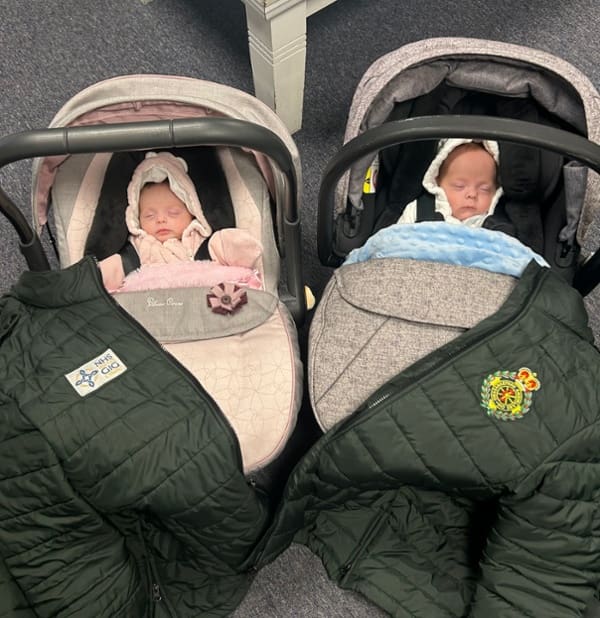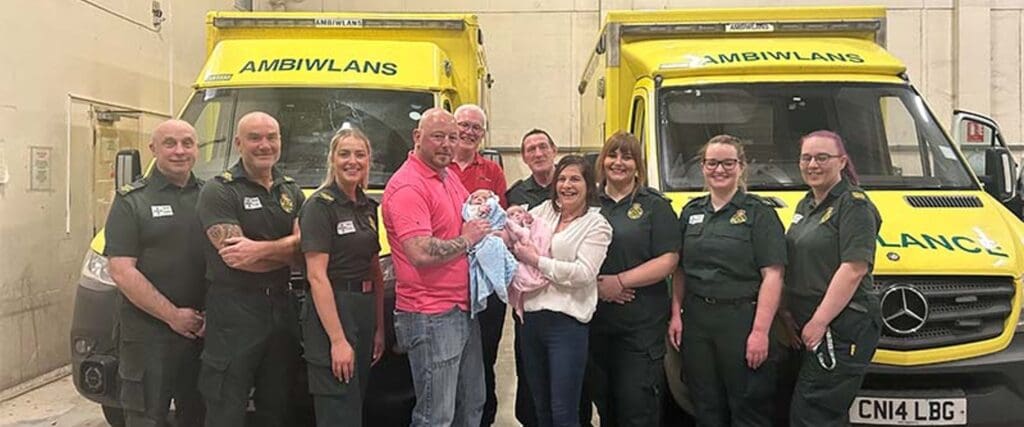A CYNON Valley mother has had an emotional reunion with the ambulance crew who supported the birth of her premature twins.
Catherine Johnson was 29 weeks pregnant when she went into labour unexpectedly at her Mountain Ash home in November.
Ambulance crews arrived to take the 36-year-old to hospital, but twins Carreg and Aneira had other plans which forced Catherine to give birth in her bedroom.
A team of 12 paramedics and technicians used specialist training they had undertaken just weeks prior to care for and safely transport the newborns to hospital.
Catherine said: “I can’t thank them enough for what they did.”
The twins’ father Mark Grice, 39, said: “Their professionalism was out of this world.
“There was no panicking – they knew exactly what to do.”

Catherine, who is also mother to Megan, 17, Dylan, 15, Ava-Marie, 10, and Cadwyn, one, was expecting an early delivery based on her previous births – but did not anticipate it would be that swift.
Her friend Sally Prosser made the call to 999, while daughter Megan helped Catherine prepare for the ambulance crew’s arrival.
Sally said: “We hadn’t been in the house long when she started to have contractions.
“They were getting closer and closer so we went upstairs to gather some things for hospital.
“The next thing I know, she had dropped to her knees on the floor.”
Call handler Annmarie Childs took the call from the Welsh Ambulance Service’s Clinical Contact Centre in Cwmbran.
She said: “It’s quite rare that we get calls for twins, so I remember it vividly.
“Sally was super calm and helpful and did everything I asked her to do.
“Call handling can be a stressful job at times, especially when there are ambulance delays, but jobs like this make it all worth it.”
First to arrive at the scene was paramedic and operations manager Hannah Ivey.
Hannah said: “Within a couple of minutes of arriving, Catherine’s waters had broken, then within a minute of that, baby number one had been born.
“Every 1° drop in body temperature below 36.5°C will increase the risk of mortality in newborn babies by 28 per cent, so priority number one was keeping them warm.
“We put baby skin-to-skin with Catherine to enable delayed cord clamping, which allows time for extra blood to flow from the placenta into the baby.
“This is important for all babies – especially pre-term babies – as it helps with the transition from life inside to life following birth.
“We also wrapped the babies in plastic bags and blankets to prevent their temperature from dropping.
“There was around a 50-minute delay until baby number two arrived, who was also breech, just to complicate matters.
“Luckily, we didn’t have to make an intervention and it was just a case of turning him to the right position.”
Paramedic Wayne Stephens took baby number one – Aneira – to hospital without delay.
He said: “Despite the fact she was premature, her colour was lovely and pink.
“We spent the 15-minute journey trying to keep her warm and maintaining our observations.
“There was a team at Prince Charles Hospital standing by for our arrival, which was a welcome relief.”
Meanwhile, paramedic Catherine Evans supported the birth of baby number two; Carreg.
She said: “Catherine was amazing – a proper ‘trooper’, even though she was quite unwell herself after she birthed the twins.”
Dr Ian Bowler, a critical care consultant at MEDSERVE Wales, was also dispatched to offer additional support.
He said: “Once both babies were born, our attention turned to mum, who had a post-partum haemorrhage.
“Mum became the patient at that point, and it was about trying to stem the bleeding.
“It was a really well-managed scene and the paramedics there were brilliant.
“We also had a fantastic reception at Prince Charles Hospital.”
Also among the team was Cymru High Acuity Response Unit (CHARU) paramedic Bryony Tolley.
More than 100 CHARU paramedics operate pan-Wales responding to the most urgent calls, including major trauma and maternity emergencies.
Bryony said: “Twins born at 29 weeks is probably most paramedics’ worst nightmare, but there’s been a big push in thermoregulation in neonates, so thankfully the training was fresh in our minds.
“We were lucky that we had as many resources at the scene as we did, and considering how premature they were, the births were relatively straightforward.
“It was absolutely vital that their temperature was maintained – without that, there could have been all sorts of complications.”
Bethan Jones is the Local Safety Champion for Maternity and Neonatal Care, seconded to the Welsh Ambulance Service as part of Welsh Government’s Maternity and Neonatal Safety Support Programme to improve the safety, experience and outcomes for mothers and babies in Wales.
She said: “The most important thing we can do for newborn babies is to keep them warm, as premature babies in particular lose heat very quickly.
“We worked closely with the Trust’s Learning and Development Team to develop an online training package and mandatory training on thermoregulation just a couple of weeks prior to the call for Catherine.
“Without a doubt, the skills and knowledge the crew had acquired supported the twins with their transition at birth.
“This would have had a huge positive impact on the journey that lay ahead for Carreg and Aneria.”
Every ambulance and response car in the Welsh Ambulance Service fleet now has ‘Neo-HeLP’ suits on board to keep babies warm.
The polyethylene occlusive suit, which babies are placed into immediately after birth, is designed to prevent hypothermia of newborns.
It is one of a number of initiatives the Trust has introduced in recent years to improve the care it delivers to new mothers, birthing people and their babies.
Steven Magee, Consultant Paramedic and Regional Clinical Lead, said: “We are one of the first ambulance services in the UK to have equipment to this standard, which we are immensely proud of.
“As well as the rollout of the new equipment, we also developed an online learning package to support our ambition to provide gold standard of care to babies in the community.
“Without that additional training, which was fresh in everyone’s minds, it could have been a very different story.”
Carreg and Aneira – who weighed 3lb and 2lb 12oz respectively – spent eight weeks in hospital following their birth in November.
Yesterday, they were reunited with the crew who supported their birth.
Mark, a builder, said: “The whole thing was a massive blur, but we’re just so grateful for everything that everyone did.
“We can’t thank them enough.”

